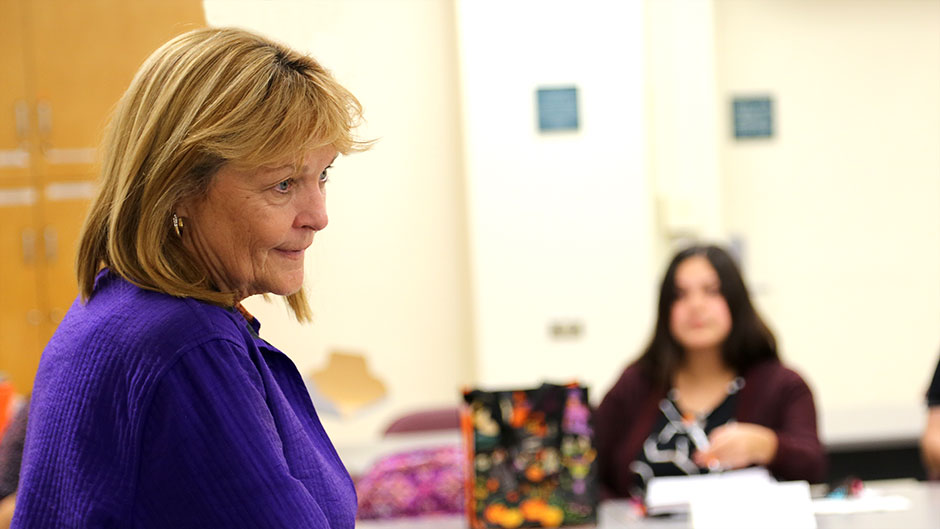MIT is starting a new academic college focused on how artificial intelligence will change the way the world works. Harvard publically released its once-secret admissions process to The New York Times. Two historically Black Colleges and Universities (HBCUs) are at risk of losing their accreditation.
Higher education institutions are constantly in the news, and Patricia A. Whitely, who in addition to serving as vice president for student affairs also teaches in the School of Education and Human Development, thinks it is important for her students to be “students of higher education” if they are to succeed as campus administrators once they graduate.
“I believe it is important for those who plan to work in higher education that they follow current topics and issues facing colleges and universities,” said Whitely, who’s graduate-level course covers the organization and administration of higher education. “I start each class discussing current events of the past week because it gives students perspective and highlights trends that they may find useful in their own work one day.”
The night’s lecture, titled “Organized Anarchy,” provided students with insights into the often-complex makeup of a university and covered topics including goal-setting, decision-making
“I provide a practical perspective into how things are actually happening and share issues that my organization is currently confronting,” Whitely said. “For example, last year, my students were able to learn about pre- and post-storm decisions related to Hurricane Irma and our campus.”
But Whitely doesn’t always tell students how the story ends. Providing as many details as she can, Whitely pauses just before she reveals the outcome to ask students, “What would you do?” Students are tasked to use the knowledge they’ve learned throughout the course to provide their own recommendations on how a crisis or issue could have been better managed or avoided altogether. This approach allows students to think critically about what they have learned in class and apply those concepts to a simulated situation.
“Dr. Whitely’s teaching style ties real-world examples from all universities to the lessons we are learning in class,” said Amy Bentancourt, who is enrolled in the enrollment management certificate program. “This helps me to understand the material a lot better than just reading the book.”
It is this practicality and applicability of the course’s material that originally drove Whitely back into the classroom. Having earned her doctorate in higher education leadership from the University of Miami, Whitely knows the value of a theoretically based education mixed with lived experiences.
“After being at UM for 15 years, I started teaching in 1996,” Whitely added. “Not only does it allow me to keep current with higher education, but I also thought that I could lend my expertise as an administrator. I really do enjoy teaching, each class is different and I learn a lot from my students as well.”
In an effort to simplify the complicated makeup of colleges and universities, Whitely uses Bolman and Deal’s four frames to organize the course’s content. These frames - bureaucratic, human resources, political and symbolic – help students to view complex problems from a variety of perspectives. Bentancourt, who also serves as assistant director for alumni engagement with the University of Miami’s Office of Alumni Relations, says that the frames have already helped her in her work.
"I have learned to look at my organization and see it through different points of view,” she said. “It has been great learning from Dr. Whitely and hearing about how her role fits into the larger UM operation.”
In addition to praise from her students, Whitely is also admired by members of the University's academic leadership for her ability to connect with students and make her course content relevant to their daily experiences on campus.
"Having a nationally recognized and experienced senior-level administrator like Dr. Whitely teaching students in our Higher Education Administration graduate program is an invaluable asset and creates quite a draw to our program," said Laura Kohn-Wood, dean of the School of Education and Human Development. "Students have consistently praised not only Dr. Whitely’s course material but also her pedagogical presence as 'compelling' and her approach as being indicative of someone who cares a great deal about educating the next generation of higher education professionals."

